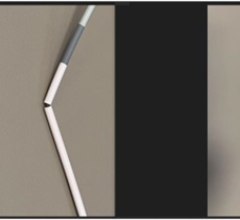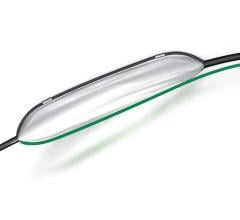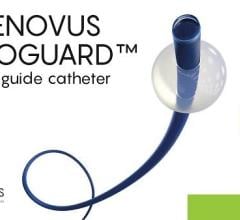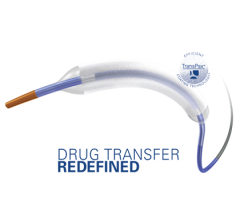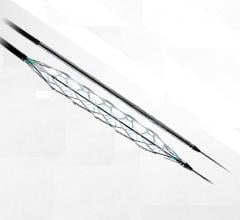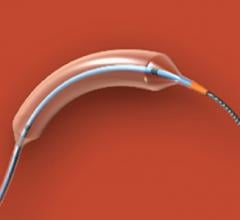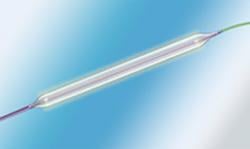
June 13, 2012 — Physicians presented at EuroPCR 2012 the results of two multicenter, randomized controlled trials, the BELLO and PACIFIER studies, each one showing statistically significant advantages of using an IN.PACT drug-eluting balloon (DEB) from Medtronic Inc. over a corresponding conventional treatment for coronary and peripheral artery disease (CAD and PAD), respectively.
Medtronic IN.PACT drug-eluting balloons received CE mark in 2008 and 2009 and are available in many countries around the world. They are not commercially available in the United States.
BELLO
The physician-initiated BELLO (Balloon Elution and Late Loss Optimization) study enrolled 182 patients across 15 hospitals in Italy to evaluate the Medtronic IN.PACT Falcon drug-eluting balloon versus the Taxus drug-eluting stent (DES) from Boston Scientific Corp. for safety and effectiveness in reducing late lumen loss in small-vessel CAD.
With both devices eluting paclitaxel, the late lumen loss (LLL) rate associated with the IN.PACT Falcon drug-eluting balloon (0.09 mm ± 0.38 mm) was superior to the Taxus DES (0.30 mm ±0.44 mm) on the primary endpoint of in-stent/in-balloon LLL at six months (p=0.001).
“The results of the BELLO study show that Medtronic’s IN.PACT Falcon drug-eluting balloon may be a viable alternative to drug-eluting stents in treating small coronary vessels that have narrowed due to atherosclerosis, in addition to vessels with in-stent restenosis,” said Dr. Antonio Colombo of Ospedale San Raffaele in Milan, co-principal investigator and presenter of the BELLO study. “Encouragingly, the angiographic findings of the independent core lab are concordant with the clinical results.”
In addition, rates of major adverse cardiac events (MACE) between the two groups were similar at six months:
- MACE – IN.PACT Falcon DEB 10%, Taxus DES 16.3%
- Death – IN.PACT Falcon DEB 1.1%, Taxus DES 1.1%
- Myocardial infarction (MI) – IN.PACT Falcon DEB 1.1%, Taxus DES 5.5%
- Target lesion revascularization (TLR) – IN.PACT Falcon DEB 4.4%, Taxus DES 7.7%
- Target vessel revascularization (TVR) – IN.PACT Falcon DEB 7.8%, Taxus DES 11%
Nearly two-thirds (64.9 percent) of the vessels treated in the BELLO study with Medtronic’s IN.PACT Falcon DEB were smaller than 2.25 mm in diameter, for which no DES is currently available.
PACIFIER
The PACIFIER (Paclitaxel-Coated Balloons in Femoral Indication to Defeat Restenosis) study enrolled 91 patients across three hospitals in Germany. The one-year results demonstrated a statistically significant advantage in preventing the superficial femoral artery (SFA) from re-narrowing when using the IN.PACT Pacific drug-eluting balloon versus conventional uncoated balloons.
On the primary endpoint results of LLL at six months, there was a statistically significant difference (p = 0.0014) and exceedingly low rate (-0.01 mm) of LLL associated with the use of the IN.PACT Pacific drug-eluting balloon compared to patients treated with an uncoated balloon (0.65 mm). PACIFIER also significantly favored the IN.PACT Pacific drug-eluting balloon on a composite of death, amputation and the need for TLR at one year (7.1 percent versus 34.9 percent, p=0.002).
“While preliminary drug-eluting balloon data from uncontrolled trials have been promising, the interventional community has eagerly awaited the results from a randomized trial to validate the clinical benefit of Medtronic’s IN.PACT drug-eluting balloons,” said Michael Werk, M.D., assistant medical director for the department of radiology at the Martin Luther Hospital in Berlin, and principal investigator and presenter of the PACIFIER trial. “Earlier research has hypothesized that drug-eluting balloons can reduce LLL, restenosis rates and the need for repeat TLR, and now the one-year results of PACIFIER show, in a randomized forum, to what extent these results are possible.”
Ultimately, Medtronic’s global IN.PACT clinical program will include 24 studies involving approximately 4,000 patients and 200 sites across more than 80 countries worldwide. Through these company-sponsored and physician-initiated studies, Medtronic IN.PACT drug-eluting balloons will be investigated thoroughly for the treatment of arterial disease in coronary and peripheral vessel beds.
In April Medtronic announced the start of the IN.PACT Global SFA clinical study, an international research program to evaluate the treatment of PAD using the IN.PACT Admiral drug-eluting balloon in up to 1,500 “real world” patients.
For more information: www.medtronic.com

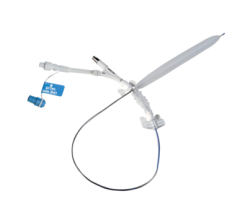
 June 13, 2024
June 13, 2024 
